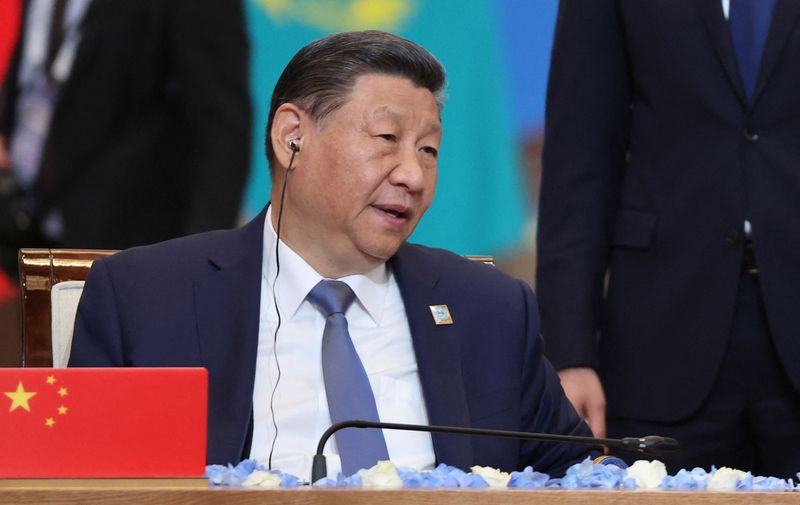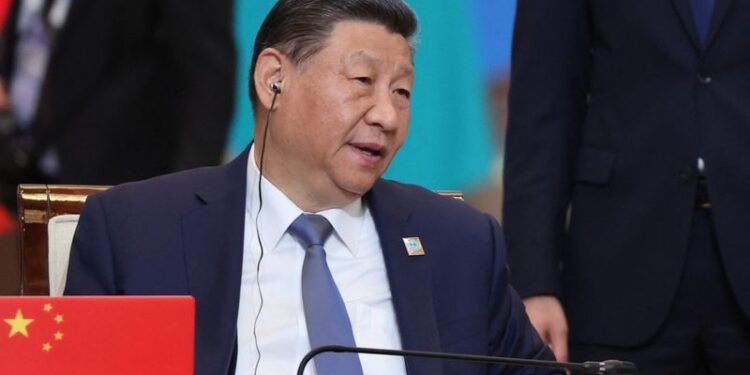By Laurie Chen
BEIJING (Reuters) – Chinese President Xi Jinping could meet his Ukrainian counterpart Volodymyr Zelenskiy next month, a former Ukrainian official said in Beijing on Thursday at the opening of China’s biggest annual military diplomacy event.
Oleksandr Chalyi, a former deputy foreign minister, told one of the opening sessions of the Xiangshan Forum that diplomacy with Beijing had improved, and a meeting was now possible.
Noting Chinese efforts to help restore European security, Chalyi said “now all of us in Ukraine are waiting for some contacts, direct contacts between President Zelenskiy and President Xi”.
Beijing has cast itself as neutral in Russia’s 30-month-old invasion of Ukraine, but maintains close strategic ties with Moscow and did not join a peace summit organised by Ukraine in June.
Ukraine’s then-foreign minister, Dmytro Kuleba, met his Chinese counterpart in Beijing in July as Zelenskiy plots another possible summit in November, this time with Russian participation.
Cui Hongjian, professor at the institute of regional and global governance, Beijing Foreign Studies University, said on the sidelines of the forum that China was open to joining a future summit as it did not want its efforts “to go to waste”.
“We are willing to do anything that is conducive for peace,” Cui said when asked about the prospect of a Xi-Zelenskiy meeting.
Ukraine is among 90 countries and international organisations represented at the highly choreographed forum, taking place from Sept. 12-14 in Beijing.
China is eager to promote itself as a responsible player in international conflicts, despite being entangled in territorial spats in its back yard. This year’s forum is themed “Promoting Peace for a Shared Future”.
The Philippines and China have exchanged accusations of ramming coast guard vessels in the South China Sea, while China made at least two incursions into Japanese airspace and waters in August.
Beijing continues to send warplanes and ships into areas surrounding democratically governed Taiwan, which China considers its own territory.
Western countries have expressed concerns over China’s growing military cooperation with Russia and “dangerous actions” in the South China Sea. In July, China and Belarus held joint military drills a few kilometres from the border of NATO member Poland.
The U.S. plans to send Michael Chase, deputy assistant secretary of defence for China, Taiwan and Mongolia, to the forum. Chase is more senior than the U.S. official who attended last year, though his rank is in line with historical norms.
U.S.-China military tensions have stabilised in recent months because regular communications channels have reopened after almost two years, though nuclear talks were halted by Beijing in July.
There is some hope that Chase’s attendance could signal deeper working-level engagement with China.
Rick Waters (NYSE:), former U.S. State Department China coordinator and current China managing director at Eurasia Group, welcomed the thawing of relations but added: “The question is, are they durable through periods of crisis?”
Most Western countries are sending small, low-level delegations, preferring to discuss international security issues at the Shangri-La Dialogue in Singapore.
Other participants included the defence ministers of Belarus, the UAE, Vietnam, Singapore, Cambodia, Chile and the Maldives as well as a deputy Russian defence minister.
The Gaza crisis is likely to dominate talks, one Western attendee said, with China’s efforts to advocate for the Palestinians likely to be welcomed by some Global South delegations.
Chinese Defence Minister Dong Jun is expected to give a keynote speech on Friday. Dong, a former naval commander appointed in December after an anti-corruption purge in the army’s top ranks, slammed Taiwan “separatists” at the Shangri-La Dialogue this year.

Responsible for China’s military diplomacy but not part of the Central Military Commission, China’s core military command body, Dong is viewed by Western military officials as a “senior but powerless emissary who is not involved in power politics”, the Western attendee told Reuters.
Last year’s forum was held without a defence minister, as Dong’s predecessor, Li Shangfu, had been removed from his role and was undergoing a corruption probe. Li and his predecessor Wei Fenghe were both expelled from the Communist Party in June over corruption allegations. (This story has been corrected to change the title of an academic from director of the Department of European Studies at the China Institute of International Studies to professor at the institute of regional and global governance, Beijing Foreign Studies University, in paragraph 6, and to adjust the description of Ukrainian in the headline)






